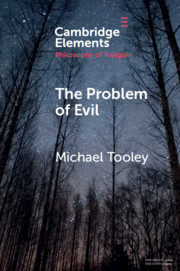Element contents
The Problem of Evil
Published online by Cambridge University Press: 09 August 2019
Summary
Information
- Type
- Element
- Information
- Online ISBN: 9781108782029Publisher: Cambridge University PressPrint publication: 29 August 2019
References
Accessibility standard: Unknown
Why this information is here
This section outlines the accessibility features of this content - including support for screen readers, full keyboard navigation and high-contrast display options. This may not be relevant for you.Accessibility Information
- 37
- Cited by
